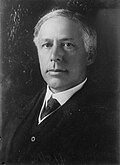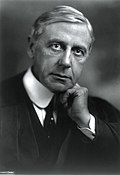Top Qs
Timeline
Chat
Perspective
List of United States Supreme Court cases, volume 259
From Wikipedia, the free encyclopedia
Remove ads
This is a list of cases reported in volume 259 of United States Reports, decided by the Supreme Court of the United States in 1922.
Remove ads
Remove ads
Justices of the Supreme Court at the time of volume 259 U.S.
Summarize
Perspective
The Supreme Court is established by Article III, Section 1 of the Constitution of the United States, which says: "The judicial Power of the United States, shall be vested in one supreme Court . . .". The size of the Court is not specified; the Constitution leaves it to Congress to set the number of justices. Under the Judiciary Act of 1789 Congress originally fixed the number of justices at six (one chief justice and five associate justices).[1] Since 1789 Congress has varied the size of the Court from six to seven, nine, ten, and back to nine justices (always including one chief justice).
When the cases in volume 259 were decided the Court comprised the following nine members:
Remove ads
Notable cases in 259 U.S.
Child Labor Tax Case
In Bailey v. Drexel Furniture Co., 259 U.S. 20 (1922), the Supreme Court ruled that the 1919 Child Labor Tax Law was unconstitutional as an improper attempt by Congress to penalize employers using child labor. The Court concluded that the "tax" imposed by the statute was not a tax, but a penalty in disguise.
Federal Baseball Club of Baltimore, Inc. v. National League of Professional Baseball Clubs
Federal Baseball Club v. National League, 259 U.S. 200 (1922), is an antitrust decision in which the Supreme Court ruled the Sherman Antitrust Act did not apply to Major League Baseball because baseball was not deemed to be interstate commerce. This decision is the main reason why MLB has not faced any competitor leagues since 1922 and MLB, to date, remains the only professional sports league in the United States with such an antitrust exemption.[2][3]
Ng Fung Ho v. White
In Ng Fung Ho v. White, 259 U.S. 276 (1922), the Supreme Court held that habeas corpus petitioners are entitled to a de novo judicial hearing to adjudicate claims that they are citizens of the United States.
Remove ads
Citation style
Summarize
Perspective
Under the Judiciary Act of 1789 the federal court structure at the time comprised District Courts, which had general trial jurisdiction; Circuit Courts, which had mixed trial and appellate (from the US District Courts) jurisdiction; and the United States Supreme Court, which had appellate jurisdiction over the federal District and Circuit courts—and for certain issues over state courts. The Supreme Court also had limited original jurisdiction (i.e., in which cases could be filed directly with the Supreme Court without first having been heard by a lower federal or state court). There were one or more federal District Courts and/or Circuit Courts in each state, territory, or other geographical region.
The Judiciary Act of 1891 created the United States Courts of Appeals and reassigned the jurisdiction of most routine appeals from the district and circuit courts to these appellate courts. The Act created nine new courts that were originally known as the "United States Circuit Courts of Appeals." The new courts had jurisdiction over most appeals of lower court decisions. The Supreme Court could review either legal issues that a court of appeals certified or decisions of court of appeals by writ of certiorari. On January 1, 1912, the effective date of the Judicial Code of 1911, the old Circuit Courts were abolished, with their remaining trial court jurisdiction transferred to the U.S. District Courts.
Bluebook citation style is used for case names, citations, and jurisdictions.
- "# Cir." = United States Court of Appeals
- e.g., "3d Cir." = United States Court of Appeals for the Third Circuit
- "D." = United States District Court for the District of . . .
- e.g.,"D. Mass." = United States District Court for the District of Massachusetts
- "E." = Eastern; "M." = Middle; "N." = Northern; "S." = Southern; "W." = Western
- e.g.,"M.D. Ala." = United States District Court for the Middle District of Alabama
- "Ct. Cl." = United States Court of Claims
- The abbreviation of a state's name alone indicates the highest appellate court in that state's judiciary at the time.
- e.g.,"Pa." = Supreme Court of Pennsylvania
- e.g.,"Me." = Supreme Judicial Court of Maine
Remove ads
List of cases in volume 259 U.S.
Remove ads
Notes and references
External links
Wikiwand - on
Seamless Wikipedia browsing. On steroids.
Remove ads











